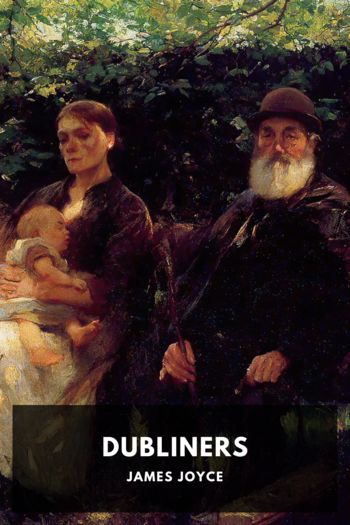Dubliners James Joyce (ebook reader web .TXT) 📖

- Author: James Joyce
Book online «Dubliners James Joyce (ebook reader web .TXT) 📖». Author James Joyce
Suddenly he saw them coming towards him. He started with delight and, keeping close to his lamppost, tried to read the result in their walk. They were walking quickly, the young woman taking quick short steps, while Corley kept beside her with his long stride. They did not seem to be speaking. An intimation of the result pricked him like the point of a sharp instrument. He knew Corley would fail; he knew it was no go.
They turned down Baggot Street and he followed them at once, taking the other footpath. When they stopped he stopped too. They talked for a few moments and then the young woman went down the steps into the area of a house. Corley remained standing at the edge of the path, a little distance from the front steps. Some minutes passed. Then the hall-door was opened slowly and cautiously. A woman came running down the front steps and coughed. Corley turned and went towards her. His broad figure hid hers from view for a few seconds and then she reappeared running up the steps. The door closed on her and Corley began to walk swiftly towards Stephen’s Green.
Lenehan hurried on in the same direction. Some drops of light rain fell. He took them as a warning and, glancing back towards the house which the young woman had entered to see that he was not observed, he ran eagerly across the road. Anxiety and his swift run made him pant. He called out:
“Hallo, Corley!”
Corley turned his head to see who had called him, and then continued walking as before. Lenehan ran after him, settling the waterproof on his shoulders with one hand.
“Hallo, Corley!” he cried again.
He came level with his friend and looked keenly in his face. He could see nothing there.
“Well?” he said. “Did it come off?”
They had reached the corner of Ely Place. Still without answering, Corley swerved to the left and went up the side street. His features were composed in stern calm. Lenehan kept up with his friend, breathing uneasily. He was baffled and a note of menace pierced through his voice.
“Can’t you tell us?” he said. “Did you try her?”
Corley halted at the first lamp and stared grimly before him. Then with a grave gesture he extended a hand towards the light and, smiling, opened it slowly to the gaze of his disciple. A small gold coin shone in the palm.
The Boarding HouseMrs. Mooney was a butcher’s daughter. She was a woman who was quite able to keep things to herself: a determined woman. She had married her father’s foreman and opened a butcher’s shop near Spring Gardens. But as soon as his father-in-law was dead Mr. Mooney began to go to the devil. He drank, plundered the till, ran headlong into debt. It was no use making him take the pledge: he was sure to break out again a few days after. By fighting his wife in the presence of customers and by buying bad meat he ruined his business. One night he went for his wife with the cleaver and she had to sleep in a neighbour’s house.
After that they lived apart. She went to the priest and got a separation from him with care of the children. She would give him neither money nor food nor houseroom; and so he was obliged to enlist himself as a sheriff’s man. He was a shabby stooped little drunkard with a white face and a white moustache and white eyebrows, pencilled above his little eyes, which were pink-veined and raw; and all day long he sat in the bailiff’s room, waiting to be put on a job. Mrs. Mooney, who had taken what remained of her money out of the butcher business and set up a boarding house in Hardwicke Street, was a big imposing woman. Her house had a floating population made up of tourists from Liverpool and the Isle of Man and, occasionally, artistes from the music halls. Its resident population was made up of clerks from the city. She governed her house cunningly and firmly, knew when to give credit, when to be stern and when to let things pass. All the resident young men spoke of her as The Madam.
Mrs. Mooney’s young men paid fifteen shillings a week for board and lodgings (beer or stout at dinner excluded). They shared in common tastes and occupations and for this reason they were very chummy with one another. They discussed with one another the chances of favourites and outsiders. Jack Mooney, the Madam’s son, who was clerk to a commission agent in Fleet Street, had the reputation of being a hard case. He was fond of using soldiers’ obscenities: usually he came home in the small hours. When he met his friends he had always a good one to tell them and he was always sure to be on to a good thing—that is to say, a likely horse or a likely artiste. He was also handy with the mits and sang comic songs. On Sunday





Comments (0)